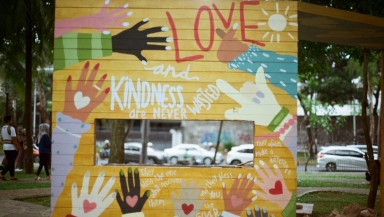
Just days after the heartbreak and recriminations of the European Championships final at Wembley, I glimpsed a vastly different perspective on the beautiful game.
In summer evening sunshine, in a pocket-sized stadium tucked into a municipal park, two lower league teams played out a pre-season friendly to a few hundred fans.
The supporters were glad to be reunited back in the ground. The teams - St Albans City of the National League South, and Stevenage FC of the English Football League's Division Two, played out 90 minutes of competent football that gave both clubs a fair run-out ahead of matches that would matter more in the season ahead.
What do I take from the match on my doorstep? And does it say anything to the UK Church, as hopefully we emerge from Covid-19?
The message is one that has loomed large throughout the pandemic - it's that local matters. And it'll matter even more in the weeks and months ahead.
The thousands of fans that cheered on England at Wembley, and the millions who watched on TV all come from somewhere. It's where they live and are rooted.
Big England matches don't come round often, or much larger than last Sunday's. Mostly, fans are following their local club, or one they have a historic or family reason for supporting. Many support that club for life.
When Netflix produced a series about Sunderland FC, they called it 'Sunderland 'til I die' - and that's a sentiment many football fans echo about their team.
Local matters, and locality matters. The Church of England divides up the country into around 13,000 parishes - so everyone is on 'the patch' of a local church. And that applies in urban, suburban and rural areas.
Every CofE church is called to tailor its mission and ministry to the specific needs of that community. The vicar and congregation know their parish. Usually, they live in it. In some areas, the vicar may be the only professional who does not commute in from afar.
Football is often strongest at its grassroots. Just like good churches which, as a friend of mine put it, should be seeking to respond 'to where the pain is greatest' in their parishes, on their doorsteps - in addition to providing services of worship, teaching and prayer.
Jesus performed his ministry in a few square miles around Jerusalem and Galilee. Yet it had global impact and eternal significance.
Throughout the early months of the pandemic, former Archbishop of Canterbury Rowan Williams wrote weekly articles for his parish church in Cambridge. He chronicled the developing pandemic and drew lessons and insights from his experience.
By seeing the Covid world through a local lens, Williams highlighted issues of national and global importance, such as trust, law and order, and racism.
Just as a network of local football clubs undergirds any country's national team, so local matters crucially to church leaders, churches and the communities they serve.
In the post-Covid world with more people working from home, former commuters could find themselves relating more closely to their neighbourhood and neighbours – as we saw during successive lockdowns. Churches need to be ready to respond.
All mission and ministry begin on our doorstep - but they can have an impact that is widespread and far-reaching.
Rev Peter Crumpler is a Church of England minister in St Albans, Herts, UK, and the author of 'Responding to Post-truth'













